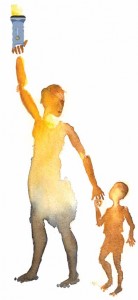 After last January’s massive earthquake in Haiti wrought its destruction on Port-au-Prince and surrounding areas, much of the impoverished nation was plunged into darkness.
After last January’s massive earthquake in Haiti wrought its destruction on Port-au-Prince and surrounding areas, much of the impoverished nation was plunged into darkness.
In the weeks following the disaster, with the electricity grid broken down and streetlights uprooted, search-and-rescue teams often worked by flashlight alone. Today, field hospitals continue to need reliable light, and an estimated 1.6 million displaced Haitians are living in dark and increasingly dangerous makeshift camps.
“There is a lot of violence in the camps and organized crime for relief supplies,” says Peter McPhee, MS ’07 (mechanical engineering).Through his role as volunteer energy systems engineer for the nonprofit Earthspark International, McPhee is committed to improving that situation.
“Our focus is putting free flashlights into the hands of women and families for security purposes,” he explains of Earthspark’s efforts. The group is working in partnership with the Clinton Global Initiative, the Haitian Ministry of Women’s Affairs, Partners In Health, and other community and relief organizations.
True to Earthspark’s renewable energy roots, the flashlight has a reliable, high-efficiency LED bulb and rechargeable solar panel in the handle, making batteries unnecessary. To date, Earthspark and partners have distributed 6,500 lamps—and they aim to have 20,000 distributed by January 2011. “We are helping to change things,” says McPhee, who traveled to Haiti in August. “Women are sharing the lamps as part of a larger community by forming safety patrols and lighting common areas. I’ve always wanted to do relief work and do something good for people in need.”
McPhee’s involvement with Earthspark in Haiti began in 2008, well before the earthquake, when the fledgling nonprofit—founded to develop and implement renewable energy systems in impoverished countries—began its work there. Their strategy: to collaborate with Haitian communities to develop and make available artificial charcoal, solar lamps, and other renewable products.
“We’re trying to seed a social, economic infrastructure using commercially available products that will improve the quality of life, economics, and health,” McPhee says. At the community level, Earthspark works to develop clean energy stores, which provide households and small businesses with clean energy services and products. He notes proudly that the group recently opened one such store in Les Anglais, a Haitian town of over 30,000 people that has no electricity. The stores also act as hubs for educating local citizens on fabricating and using clean energy technologies.
It’s clear that nothing energizes McPhee like renewable energy sources. When he’s not volunteering with Earthspark, he works full time for the Massachusetts Clean Energy Center, where he serves as project manager. His role there involves researching and evaluating existing technology for reliability, usability, durability, and long-term sustainability. He also serves on the Somerville, Massachusetts Commission on Energy Use and Climate Change.
“When I was a teenager, I realized that the quality of your environment affects your life,” says McPhee. “How you use energy—the way we treat our world—has a big impact on poverty.”




